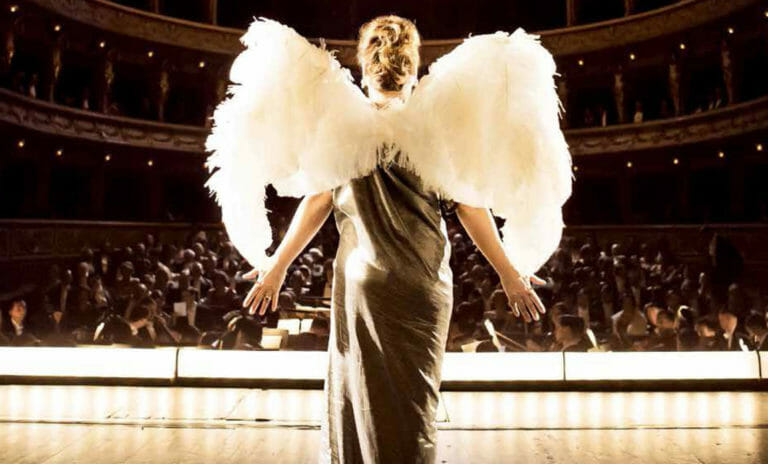Sign up for the
TSL Newsletter
and get $50 off Final Draft 12
By Madeline Dennis-Yates · April 15, 2016

Warning: Some spoilers to follow!
Marguerite is a French film about a very bad singer, and a great example of a narrative that bends the truth of the given material to tell the best possible story. If you’ve heard of Marguerite, you’ve probably also heard of the upcoming Meryl Streep project on the same topic, the real woman with the terrible voice (and namesake of the Streep film), Florence Foster Jenkins. The trailer for Florence Foster Jenkins is unabashedly perky and goofy, an easily comic take on this woman’s story. Marguerite certainly has a lightness to it, and the characters are often caricatures of artistic or wealthy types, but for the most part, the film is fair to its subject, letting her keep her dignity and allowing us to feel genuine empathy.
Florence Foster Jenkins was from Wilkes-Barre, Pennsylvania, and spent most of her life in that state, which already gives her story a drastically different tone from that of the fictional Marguerite’s. We find Marguerite on the day of a private performance on her gorgeous French estate, which holds her wealthy or artistic “fans” – and a peacock, whose plume she nabs at the last moment to complete her look. Though we don’t see the peacock much after this, its screeches are heard throughout the film at fairly regular intervals.
The thing that really gives Marguerite its unique context is the subversive art world in the title character’s peripheral vision. A young writer and his unpredictable Dadaist friend become enamored with Marguerite at her private recital and pull her part of the way into their circle. Marguerite is surprising here – not scoffing or prejudiced at all, as one could expect someone of her socioeconomic status to be, but instead filled with wonder at a form of artistic expression that’s new to her. Maybe she’s not a narcissist who thinks of herself as some kind of elegant, musical bird, but just someone who is deeply touched by art and longs to be part of it.
This motivation makes us empathize with Marguerite, and it makes us understand why she pushes things too far. She unwittingly joins an anarchist performance piece put on by the young artists and is thrilled by the audience’s animated (mostly furious) reaction. What could be better for an artist than to provoke such emotion? As her husband fights to protect Marguerite from humiliation, she begins a career. Among the actors, singers, and assorted artists of often-indeterminate sex and sexuality, Marguerite enjoys herself and feels at home. You can’t blame her for wanting to be directly involved. The conflict is that Marguerite does not know that she actually is just as unusual as the rest of these artists. Those who love her as an artist do so because she has a terrible voice, but no one has ever had the nerve to explain this to her.
This gives the whole film a feeling of wobbling on a tightrope toward a certain fall, but we still hope that it will all turn out okay in the end. Spoiler: it doesn’t. The ending is a crashing, stunningly bleak moment of brazen theatricality, and you may find yourself wondering when all the humanity got sucked out of the room. It is certainly not an optimistic note to end on, and it makes you wonder if you shouldn’t have been laughing so much throughout the rest of the film.